#otomo no yakamochi
Text
Better not to meet
you in my dreams,
than reaching over
for hands not there.
Otomo no Yakamochi (718-85)
transcribed (and possibly adapted) from a book of early Japanese poetry in the shadowy stacks of Cambridge University Library thirty years ago – any thoughts on a more detailed source would be much appreciated
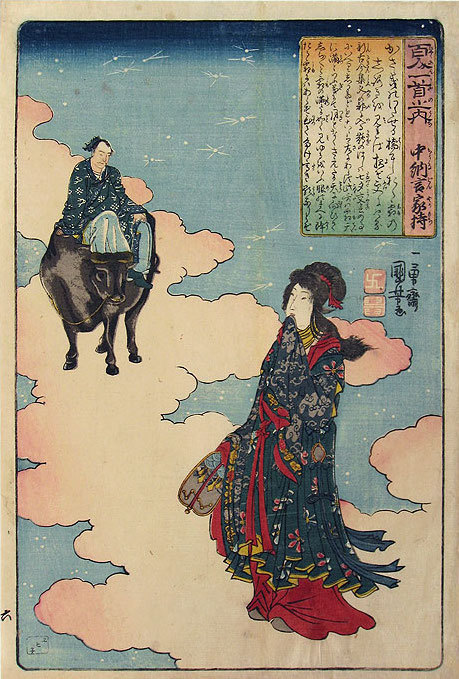
image from here
30 notes
·
View notes
Photo
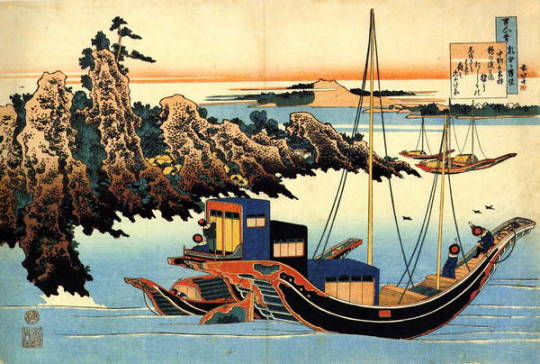
(via Serie de cent poemes par cent poetes)
#art#artwork#kunst#kunstwerk#katsushika hokusai#print#druck#asian art#asiatische kunst#otomo no yakamochi#nature#natur#boat#boot#sea#meer#ocean#ozean#water#wasser
20 notes
·
View notes
Text

#literature#literary quotes#japanese literature#quotes#bookblr#book quotes#books#mood#classical literature#otomo no yakamochi#sorrow
0 notes
Text

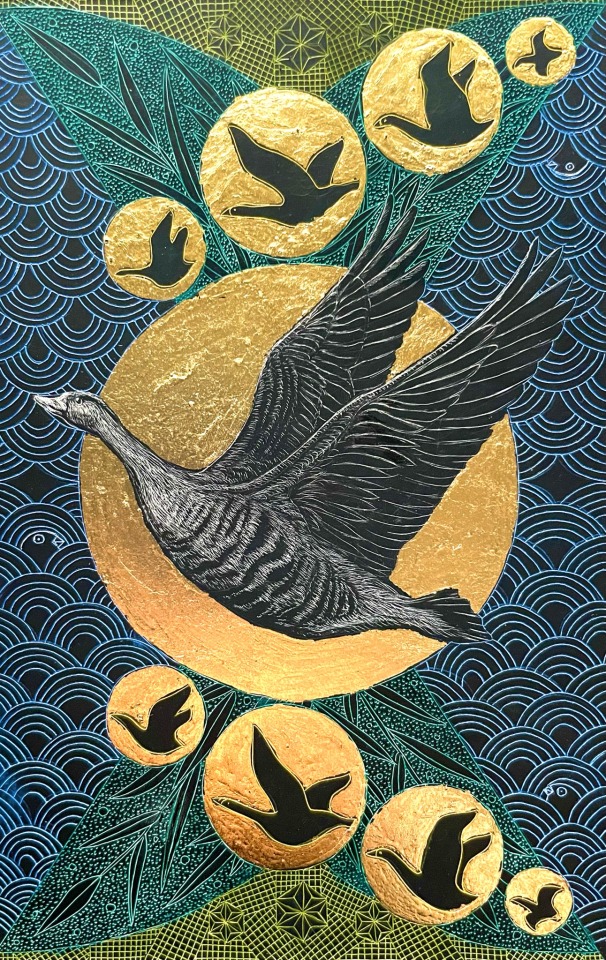
新潟の展示に出す、新作のご紹介です。
連作
「燕来る時」
「雁がねは雲隠り鳴く」
渡り鳥をテーマにした連作で、万葉集に掲載された大伴家持の歌、「燕来る 時になりぬと 雁がねは 国偲ひつつ 雲隠り鳴く」を元に制作しました。
燕は春に日本にやってきますが、同時期に雁(がん、かりがね)は日本を去ります。渡り鳥の交差する様に、家持は郷愁の想いをのせて歌いました。
今回は3人展のお題として渡り鳥を描いたのですが、描いているうちに自分にも感じ入るところがありました。長文になりそうなのでその旨は次回投稿でご紹介できればと思います。
【新潟展示会】
若手芸術家3人展〜渡る鳥の物語〜
2023年9月6日(水)〜12日(火)
新潟伊勢丹7階イセタンアートギャラリー
10:00-19:00(最終日16:00終了)
Here are some new works to be exhibited in Niigata.
series of works
“When the Swallow Comes”
“The Wild Geese Cry as the Clouds Hide Behind Them”
This series of works on the theme of migratory birds is based on Otomo Yakamochi's poem from the Manyoshu (Japan's oldest anthology of poems).
Swallows come to Japan in spring, while geese leave at the same time. Yakamochi composed this poem about the crossing of migratory birds with a sense of nostalgia.
I drew migratory birds as a theme for this three-person exhibition, but as I was drawing, I also felt something for myself. I hope to introduce this in my next post, as it is likely to be a long story.
【Exhibition in Niigata】
Three Young Artists Exhibition - Tales of Crossing Birds
6(Wed) - 12(Tue) September 2023
Isetan Art Gallery, 7th floor, Isetan Niigata
10:00-19:00 (last day closes at 16:00)
1 note
·
View note
Quote
Mist floats on the Spring meadow.
My heart is lonely.
A nightingale sings in the dusk.
Ōtomo no Yakamochi, from “Mist floats”; One Hundred Poems from the Japanese (tr. by Kenneth Rexroth)
263 notes
·
View notes
Text
Two Tanka
by Otomo No Yakamochi
From outside my house,
only the faint distant sound
of gentle breezes
wandering through bamboo leaves
in the long evening silence.
Late evening finally comes:
I unlatch the door
and quietly
await the one
who greets me in my dreams.
165 notes
·
View notes
Photo
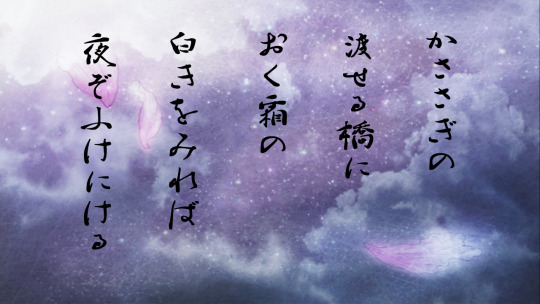
When I see the whiteness of frost upon the Bridge of Magpie Wings, ah indeed, the night has deepened.
かささぎの渡せる橋におく霜の白きを見れば夜ぞふけにける
Kasasagi no / wataseru hashi ni / oku shimo no / shiroki wo mireba / yo zo fukenikeru
As the night deepens, the dawn nears. At the end of this strange year, may this old image of a deep night bring hope of the dawn already near.
Hyakunin Isshu 6: Ōtomo no Yakamochi (as always, link to the poem analysis is in the notes below)
This is so fresh off the press (well, my keyboard) I’m afraid I’m sharing this too soon, with too many incoherent sentences and lapses in logic. But I have been thinking and hoping that maybe, in this strange time and with Christmas just a day away, this can bring some calm and hope to those in need.
Wishing you a very merry and calm Christmas ✨ Stay safe.
Until the next poem.
#Ogura Hyakunin Isshu#Hyakunin Isshu#小倉百人一首#百人一首#Otomo no Yakamochi#Chihayafuru#ちはやふる#Chihayafuru poems#Chouyaku Hyakunin Isshu: Uta Koi#Japanese poetry#Waka poetry#poetry#Ōtomo no Yakamochi#大友家持#poetry in translation
19 notes
·
View notes
Text
夢之相者 苦有家里 覚而 掻探友 手二毛不所觸者
大伴 家持
3 notes
·
View notes
Text
How the night deepens.
A ribbon of the whitest frost
is stretched across
the bridge of magpie wings
the lovers will cross.
--Otomo no Yakamochi
0 notes
Text
79
Wangji wishes for the one who greats him in his dreams to open the Jingshi's door. A part of Wangji's heart hasn't ceased, will never cease, to long for him.
The only door he can open now is the bittersweet one leading to dreams and memories. It has been such for thirteen years now. And will be for as long as Wangji lives.
In the gentle moonlight, Wangji closes his eyes and lets his breathing slow down. His body feels heavier and heavier until it feels like nothing at all.
And holding out his hand towards Wangji, appears Wei Ying.
_____
previous - next
#the untamed#cql#100 moons away#heavily inspired by a tanka by otomo no yakamochi that i read a few days ago#well a translation#and ever since it lives rent free in my head#so deal with it guys#and i'm in a Big Yearning mood today#and i've also read some other beautiful Yearning texts written by my friends#guys i love them#and well you see the result lmao
21 notes
·
View notes
Text
A poem by Michael Longley
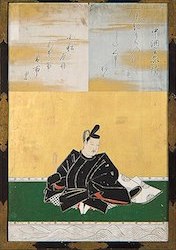
To Otomo Yakamochi
On receiving the inaugural Yakamochi Medal
You, Otomo Yakamochi,
Poet and governor, and I
Minor bureaucrat, and poet too,
Meet across thirteen hundred years
To talk about birds and flowers.
Lover of cuckoos and wisteria,
For you I have saved meadowsweet
And willowherb and loosestrife
And the meadow pipit’s few notes
And the skylark’s aria.
We gaze on our soul-landscapes
More intensely with every year –
Small boats passing Inishbofin,
Small boats on the Nago Sea,
Wokami River crimson-lustrous.
Barnacle geese our messengers
Across space and time, Otomo –
Tormentil closed by the rain
And centaury, tiny boxes
Yellow and pink, Japanese.
Anything however small
May make a poem, a snail, say,
Tucked into the marram grass,
In the distance Tateyama
Or Mweelrea, holy mountains.
I picture you at the White Strand
Galloping through the breakers,
Spring-tide and rain and spray
Kicked up by your horse’s hooves
Drenching bridle and stirrups.
A small townland becomes my life,
Carrigskeewaun, grandchildren
Wading in the tidal channel –
Otomo, my soul’s a currach
Disappearing behind the waves.

Michael Longley
This poem is from Michael Longley’s new collection, The Candlelight Master.
Image: Otomo Yakamochi by Kanō Tan'yū, 1648
0 notes
Text
Advent Challenge 3/24
From @pastelsandhazelnutcoffee‘s Advent Challenge
My Advent Challenge: Every day from the 1st of December until the 24th of December, post a poem from the 百人一首 (Hyakunin Isshu - One Hundred Poets, One Poem Each) in Japanese, translated into English.
Today’s poem is a wintry one, which I thought apt for December. Although most modern interpretations suggest that this is a Tanabata-related poem, current interpretations suggest that this might be referring instead to the imperial palace, and actual frost.
6番 (Poem 6)
Kasasagi no
wataseru hashi ni
oku shimo no
shiroki wo mireba
yo zo fukenikeru
かささぎの
渡せる橋に
置く霜の
白きを見れば
夜ぞふけにける
When I see the whiteness
of the frost that lies
on the bridge of the magpies,
then I know, indeed,
that the night has deepened.
Otomo no Yakamochi (718 - 785)
#advent challenge#pastelsandhazelnutcoffee#japanese langblr#百人一首#ogura hyakunin isshu#tokidokitokyo#phcadventchallenge
25 notes
·
View notes
Photo

0 notes
Text
to reach for hands that are not there
read it on the AO3 at https://ift.tt/2Vt4Q9Z
by avienexjel
"better never to have met you in my dream than to wake and reach for hands that are not there."
- otomo no yakamochi
Now when he wakes up in the mornings and sees the sunlight drifting through the window, he thinks of Steve's blonde hair - the color of it, the way he parts it on the side sometimes like all the old photographs from the 40s. When he gets out of bed and the chill air hits his bare arms, he thinks of ice, and planes, and sacrifice.
God, he's so lonely.
Thinking about Steve is so lonely.
Words: 5033, Chapters: 1/1, Language: English
Series: Part 2 of one-shots with raw emotion
Fandoms: The Avengers (Marvel Movies), The Avengers (Marvel) - All Media Types
Rating: Not Rated
Warnings: Creator Chose Not To Use Archive Warnings
Characters: Tony Stark, Steve Rogers, Sharon Carter (mentioned), Natasha Romanov (Marvel)
Relationships: Sharon Carter/Steve Rogers, One-Sided Tony Stark/Steve Rogers
Additional Tags: Hurt Tony Stark, Tony Stark Needs a Hug, Tony Stark Doesn't Get a Hug, Tony Stark Feels, Tony Stark-centric, Unrequited Love, Pining, One-Sided Attraction, One-Sided Steve Rogers/Tony Stark, Heartbreak, unrequited pining
read it on the AO3 at https://ift.tt/2Vt4Q9Z
2 notes
·
View notes
Text
008.2: Discover the Endless
When I noticed that the librarian was nowhere to be found out of the wall room, I tried to manually search some literary works if the room has it or not, so I would know whether or not to go to the books section. Appeared in front of me are what the books section could offer me. I thought to myself I could have read everything in this room easier than I did with half of the time being in historical backgrounds then walking to the aisles for books. I tapped on the poetry tab and saw Manyoshu, Japan’s known oldest collection of Waka which was compiled during the Nara Period. It is also known as Collection of Ten Thousand Leaves and is the high point of Japanese poetry. It has twenty volumes which was divided to three genres: Zoka which was sang at banquets, Somonka which was sang by women and men in love, and lastly, Banka which was sang in mourning deaths. It contained about four thousand and five hundred, ten percent of it being Otomo no Yakamochi’s - the poet whom many scholars considered to be the one to compile all of Manyoshu. Other contributors’ names were Kakinomoto Hitomaro – Japan’s first great literary figure, and Yamanoue Okura – a member of Japanese embassy with missions brought to Tang China. A lot of later poets were inspired by the imagery, phrases, and styles seen in the work, and has since then been studied by different artists.
Another work of art is the Essays in Idleness – also known as Tsurezuregusa in Japanese – written by Yoshida Kenko. It is another collection, this time, of aphorisms and essays, all inspired by the events around Kenko’s time. He shared his stories of aesthetics, behavior, and impermanency – a downward trajectory of a man’s life. Essays in Idleness is not exactly made to be memorable, in fact, Yoshida himself wrote that all that is in his work were his nonsensical thoughts he had. But his opinion aside, his work was the product of him being anachronistic, ethical, nostalgic, observant, sentimental, and traditional.
0 notes
Text
by Otomo No Yakamochi
From outside my house,
only the faint distant sound
of gentle breezes
wandering through bamboo leaves
in the long evening silence.
Late evening finally comes:
I unlatch the door
and quietly
await the one
who greets me in my dreams.
0 notes